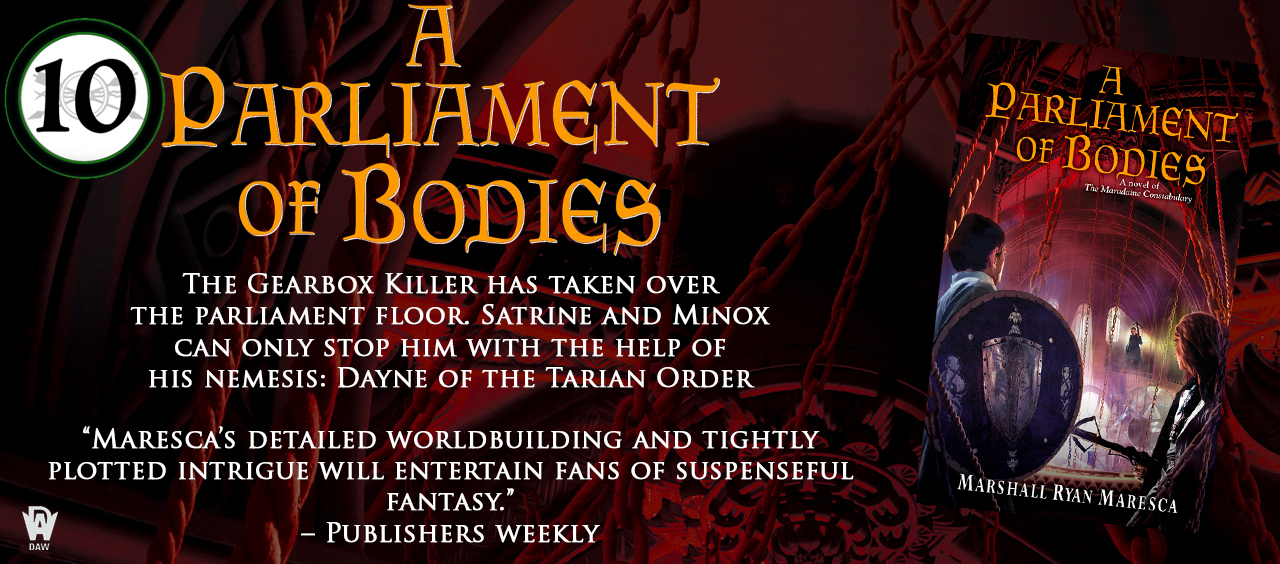
CHAPTER ONE
Satrine Rainey would never have guessed that she would make a habit of waking up before sunrise to go to Absolution at Saint Limarre’s Church. In her nearly forty years, she hadn’t ever bothered with the ritual. Her soul was probably beyond salvation; she had accepted that. But she needed to talk, and she was filled with secrets too terrible to hold in, but too dangerous to entrust to anyone.
Anyone but Sister Alana, under the silence guaranteed by the rite of Absolution. Sister Alana would never tell her secrets. The ritual was taken very seriously by both the government and the church, so nothing said under Absolution could ever be used in persecution or prosecution.
Even the secrets of a not-so-former spy turned Constabulary Inspector.
Of course, Sister Alana was more than just a Cloistress of the Blue in the Church of Druthal. She was an old friend-the only person left from Satrine’s childhood on the streets of Inemar who could be called that. Most others from those days were dead, jailed, or wasted. Hardly any of them were someone she would have considered a friend even back then. Her own mother-that waste of flesh named Berana Carthas-had abandoned her when she was twelve. Just left to live with some man who didn’t want to deal with a daughter.
Sister Alana was the only person who knew everything about who she was, who she had to become, and who she was now.
She knew Satrine well enough to be sitting on the back steps of Saint Limarre’s, looking out at the small burial field behind the church, waiting with pastries and two cups of tea.
“I didn’t tell you I was coming today,” Satrine said as she walked up.
“Didn’t need to,” Sister Alana said, standing up and embracing Satrine. “I saw last night’s newssheets. Tea?”
“It seems too hot for tea.” It was now autumn, but the sweltering summer heat still hadn’t broken. Even now, before the sun had properly showed itself over the towers of East Maradaine, the heat was oppressive. For the past few months Satrine had forsaken the traditional coat of a Constabulary officer, usually wearing just her shirtsleeves and inspector’s vest.
“You’ll drink it anyway,” Sister Alana said, sitting back down on the steps. She was right. Satrine may have made a habit of seeing Sister Alana early in the morning, but she wasn’t accustomed to it. Most nights she barely managed to sleep at all. She took the tea and sat next to the cloistress. “How was your Saint Helsen’s Day?”
The fact that yesterday had technically been a holiday-both the equinox and a Saint Day-had barely registered on Satrine. She worked the whole day, and there was no particular observance she would make to Saint Helsen. She didn’t even know Saint Helsen’s story.
And in thinking that, it came to her, courtesy of her telepathically induced education. Saint Helsen, Savior of Harvests. The Sickle-Bearing Pilgrim.
“It was work. And you know that.”
“Bless those whose work keeps us safe.”
At least last night she went home at a reasonable hour. She was able to eat dinner with Rian and Caribet, spend time taking care of Loren. She hadn’t realized how much Rian had sprouted over the summer. Her eldest daughter was now almost as tall as she was, and looked far older than her nearly fifteen years. Her summer working the glove counter at Henson’s Majestic store had done wonders for the girl’s maturity. And the money helped. For the first time since Loren’s accident, it didn’t feel like they were just scraping by each day.
“The girls go back to school today,” Satrine said idly.
“You aren’t here to chat about the girls.”
“No,” Satrine said.
Sister Alana closed her eyes for a moment. “May our voices only be heard by God and the saints, for our words are for no one else.”
“Thank you,” Satrine said. “So what did you read in the newssheets?”
“Many things, most of which probably had nothing to do with you and yours.”
“Aventil had another street war last night. Nine dead, including two constables.”
“Aventil isn’t supposed to be your problem.”
“I’m in the Grand Inspection Unit now,” Satrine said. “The whole city is technically my problem.” In truth, in the months since they had launched the GIU, it had been a steep learning curve of what the new unit meant. They were supposed to handle the big cases, the ones that had a wider scope than any one precinct. What it really meant was fighting with stationhouse captains, officers, and patrolmen over jurisdiction and resources.
“You’ve been sweating over Aventil for the past few weeks.”
“Why shouldn’t I? Welling and I work one case, and right after that, gang wars explode. Two of the gangs are determined to destroy each other, another splinters into two factions, and I just wonder . . .”
“If you could have stopped it then?” Sister Alana sighed. “Please, Satrine. Aventil has been a nightmare since we were girls. You couldn’t have saved it. You definitely didn’t start it.”
“And then there’s the new case. Cases.”
“The children?”
“No, that one is on Mirrell and Kellman.”
“I thought you and Minox were working it.”
Satrine sighed. Minox had pushed the idea that a series of missing children-mostly street rat kids like she and Sister Alana had been when they were Tricky Trini and Lannie Coar-were part of a larger case that warranted deeper investigation. Evidence had connected those missing children to a handful of other cases involving children from working-class families, and even a few from minor nobility. Minox had put the pieces together-notably the similar witness reports from all over the city-to show that there was some sort of larger conspiracy to kidnap children. Though for what, he still had no idea. Satrine suspected another fighting ring, or something even more disturbing.
Once Minox had presented his evidence to Captain Cinellan, the case got a lot more notice. That meant it wasn’t going to be handled by the inspectors who handled “the strange ones.” Not by Satrine Rainey, who was still loathed throughout the city Constabulary for faking her way to an Inspector’s rank with forged orders, or by Minox Welling, the Uncircled mage who still had the threat of Inquiry hovering over his head. So the pile of files for the missing children went to Mirrell and Kellman. Satrine didn’t understand why-they weren’t very inquisitive or investigative. A delicate case that involved a lot of moving parts, that was not their forte.
“No, we’re working the Gearbox Murders. That’s what the gaudier newssheets are calling it.”
“Yes,” Sister Alana said. “I rather like the gaudy newssheets. There’s something honest about the level of viscera they commit to.”
“You’re talking about the ones with the drawings.” Satrine picked up a pastry. She was going to need something in her system for this.
“I really have to ask,” Alana said, picking up one of the newssheets she had stacked next to the steps. “These contraptions you find the victims in. They aren’t actually this elaborate, are they?”
Satrine took the paper from her. The sketch showed a monstrosity of machinery, with gears and blades and some poor woman caught in the thing while bits of her were being sliced off. As gruesome as it was, there was also an almost comical aspect to it, as the machinery also had strings, candles, mice in wheels, and a whole assortment of elements that were purely the artist’s imagination.
“Nothing like that,” Satrine said. “Most of the time we never even saw the machine. . . . I’ll spare you the gore. There were five deaths-that we know of-before we realized they were connected. Now seven.”
“Who are they?”
“Victims from every part of the city, each found in a different part of the city. No rhyme or reason behind it. Men, women, old, young, rich, poor.”
“Noble?”
“Not yet. But . . .” She hesitated to voice her thoughts.
“Go ahead.”
“Whoever is doing this, they’ve got resources. They’ve got time. And they want attention. If it isn’t nobility, or at least someone with money and influence, I’ll eat my vest.”
“And this theory of yours has met with resistance?”
Sister Alana hit on the point. “Minox doesn’t think so. He thinks this is someone with a message. There’s a grand scheme to it.”
“A grand scheme for what?”
“He’s not sure. He can’t figure out the message.”
“And so his theory holds more credence than yours why? After all, the theories don’t exclude each other.”
“It doesn’t, just . . .” Satrine sighed, taking a bite of the pastry. “When he gets his hunches, he just digs into them like a crab on the beach.”
“Did he spend the night in the stationhouse?”
“Probably,” Satrine said. “If I were to predict-“
Before Satrine could finish that thought, the back doors of the church burst open, and a young blond woman in nightclothes stormed out, swinging a great candlestick like a sword. “Betrayal! Beware the betrayal and escape the darkness!”
Satrine was on her feet, instinctively grabbing her handstick, but Sister Alana had already reacted. In swift motion, she ducked the swinging candlestick, popped back up, and knocked the blond woman in the face with a perfect punch.
The blond woman dropped to the ground, and then looked around rather confused.
“Sister Alana,” she said curtly. “Why am I in the back garden in my sleeping attire?”
“You were having one of your spells again, Sister Myriem,” Sister Alana said. “Go inside and clean yourself off. I’ll come to check on you shortly.”
Sister Myriem stood up and dusted herself off, giving Satrine a polite nod before returning inside the church.
“She’s still a problem?”
“Not for long,” Alana said with a heavy sigh. “Or at least, not mine. She’s going to be transferred to Saint Bridget’s. Not my doing. The other cloistresses here are terrified of her.”
“Really?”
“This fit was a sedate one for her,” Alana said. “In a few weeks, she’ll be gone. May the saints forgive me, but I will sleep easier.”
“I wish I could.” Sleep hadn’t been easy . . . all summer, frankly. Between the rigors of the job and the strain of caring for her husband, it had already been hard enough. The words a Lyranan spy had whispered in her ear had set her thoughts spinning every night. “You’re working with a traitor.”
Sister Myriem screaming “Betrayal” in her fit didn’t help. Something about that young woman was just unnerving. She didn’t blame Alana for wanting to be rid of her.
Alana guessed her thoughts. “Do you honestly suspect Minox is a traitor of some sort? In collusion with corruption?”
“Not at all,” Satrine said. “But I can’t shake the feeling. Pra Yikenj spoke with . . . conviction. And she had proven insightful before.” Satrine’s first encounter with Pra Yikenj had been a little over fifteen years before, when the spy had noticed Satrine was pregnant before Satrine had.
“She wanted to rattle you.” Alana glanced about furtively. “And your other masters? What do they think?”
“Druth Intelligence isn’t telling me anything new, other than to remind me that there’s some sort of corruption in the Constabulary that they worry about. Which . . . isn’t useful to tell me.”
“So what will you do today?”
Satrine was about to answer, when she heard the pounding of feet and a wheezing breath that was oddly familiar. “I think I’m about to get summoned to the stationhouse.”
And then Phillen Hace, newly minted Senior Page in the Constabulary, raced into the churchyard. “Inspector Rainey.”
“Phillen,” Satrine said calmly, picking up her tea and sipping it. “Did Inspector Welling send you in search of me?”
“Yes,” Phillen said.
“And did he presume to tell you to find me here?”
Phillen looked guilty for a moment. “Yes.”
“Has he been there all night?”
“Near as I can tell, ma’am. I mean, I slept.”
“Fine. Be with you in a moment.”
“Yes, ma’am,” he said with a bit of a salute. He gave a nod to Alana. “Begging your pardon for interruption, your glory.”
“Always, son.” As Phillen went to the street, Alana sighed and looked at Satrine. “Never the time we need.”
“Come to the house sometime,” Satrine said. “I would love you to meet the girls.”
“I’ll try. I don’t get much chance to cross the river.”
Satrine let Sister Alana embrace her one more time and went off to where Phillen was waiting patiently for her.
A thought crossed her mind. “You do go home sometimes, yes?” She had never thought to ask the boy that. He always seemed available when Welling sent him, at any hour.
“No point, ma’am. Ain’t had a home for a year, save the stationhouse. And that’s the best year I’ve had.”
“What about your mother?” Satrine asked. “You’ve mentioned her before.”
“I have, indeed,” he said. “That year I brought up? It’s been the year she’s been in the Quarry for theft and grift.”
“Oh, I’m sorry,” she said. She knew he had no fondness for his mother-she understood that all too well-but she also understood it wasn’t easy to feel nothing for one’s mother.
“Don’t be,” he said. “I’m the one who got her nabbed and ironed.”
“How long does she have left to serve?”
“Five days,” Phillen said as they approached the stationhouse. “It should be interesting.”
“Let me know if there’s anything you need,” Satrine said. Phillen nodded and dashed off. She steeled herself and went into the stationhouse. There was surely about to be some form of aggression or difficulty facing her, from the patrolmen or the desk sergeants, or most likely Miss Nyla Pyle, the floor clerk for the GIU who hated Satrine with cold fire. All that she was used to.
That was part of her every day.
Sleep had not been a priority for Minox Welling for the past few days, catching only a few hours in the stationhouse bunk to refresh his mind before returning to his analysis of the “Gearbox Killer” murders.
He had to confess, it was possibly the most singularly troubling case he had ever encountered in his time as an Inspector Third Class in the Maradaine Constabulary. He had never before seen a case where the murderer had no apparent motive beyond the thrill of killing. That, and the message Minox theorized was hidden within the murders.
“There is no thrill to killing,” Joshea Brondar said. “I spent three years in the army trying to avoid it if I could.”
“That’s you,” Minox said quietly. “Men like you and me are fundamentally decent. But to the deranged mind-which is clearly what we’re dealing with-there is.”
Joshea picked up one of the charcoal sketches of the crime scene. “Is it all right if I look closer at this?”
PURCHASE A PARLIAMENT OF BODIES:
Additional Links:







